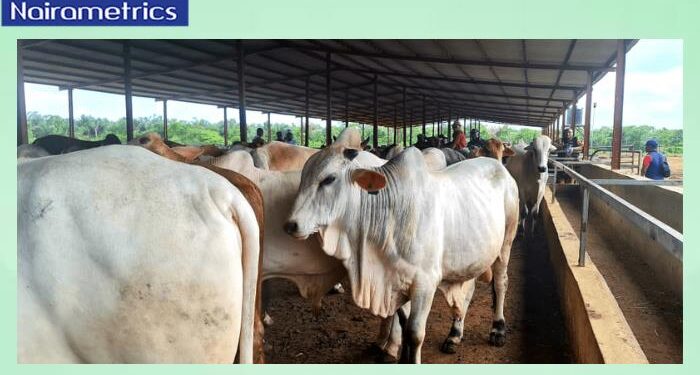Lagos, Nigeria’s commercial heartbeat, runs on an insatiable appetite for red meat. Every day, thousands of cattle, goats, and rams pass through the city’s bustling abattoirs to feed more than 22 million residents.
According to the Lagos State Ministry of Agriculture, the state consumes an estimated N328 billion worth of beef annually. The state requires about 1.87 million heads of cattle (equivalent to 468,416 metric tonnes of beef) each year to meet part of its protein demand.
Despite this massive consumption, local production remains extremely low. Figures from the ministry indicate that only 12,399 heads of cattle of the total demand are produced within the state. This leaves a wide supply gap that is largely filled through imports from Northern Nigeria and neighbouring countries such as Niger, Chad, Cameroon, and Burkina Faso.
According to the Development Agenda for Western Nigeria (DAWN), the southwest region is the highest consumer of livestock products in Nigeria, earning a place of importance in the global livestock industry. Of this region, Lagos state accounts for about 70% of the numbers.
Lagos currently has no functional ranch, even though the government is working on the Eko Ranch Project, designed to promote local cattle rearing, reduce reliance on imports, and strengthen food security.
Last year, no fewer than 10,000 heads of cattle were slaughtered in Lagos daily, including those processed in military barracks. This shows a big contrast: Lagos eats the most meat in Nigeria, but also remains the least self-sufficient in production. According to reports, Lagos state has a total of 16 abattoirs, of which the state government runs 11. However, many of them remain obscure.
Here is a list of 8 major abattoirs in Lagos

Matori Slaughter Slab is located in Mushin Local Government Area. The facility operates within one of Lagos’ most congested and commercially active districts. Mushin itself is situated approximately ten kilometers north of the Lagos city core, has evolved into a major commercial and industrial hub.
The Matori area along Fatai Atere Way hosts numerous manufacturing and commercial enterprises alongside residential neighborhoods. The slaughter slab serves the community and surrounding areas, including Oshodi, providing a crucial source of fresh meat to local markets and butchers.
As one of the officially approved facilities by the Lagos State Ministry of Agriculture, Matori operates under veterinary supervision, with inspectors deployed to examine animals before and after slaughter to certify meat is fit for human consumption.

















